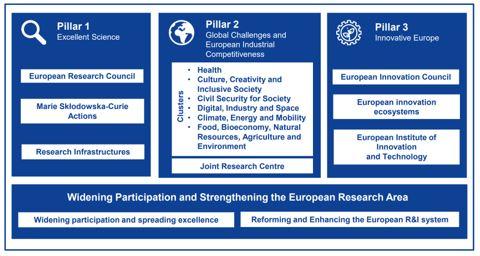Research and Innovation in Horizon Europe

Horizon 2020 – the EU’s biggest ever Research and Innovation programme – will end next year. With an expected budget of around €100 billion, its successor for the period 2021-2027, Horizon Europe, aims to be even more ambitious, with a greater focus on supporting the emergence of a low carbon economy and tackling climate change.
Global Challenges
Just over half of Horizon Europe funding has been earmarked for tackling global challenges and boosting industrial competitiveness. Actions within this second pillar will be divided into seven thematic clusters, including one dedicated to Climate, Energy and Mobility with a proposed €15 billion pot.

This cluster will support projects of direct benefit to regional and local authorities, developing new technologies and approaches that can be used, as well as providing opportunities for cities and regions themselves to join as research partners.
Horizon Europe aims to support the achievement of the European Union’s policy objectives, including supporting development of sustainable infrastructure, services and systems for smart and sustainable communities and cities, low-carbon hydrogen and fuel cells, renewable energy technologies, energy storage, decarbonisation of Europe’s building stock, zero-emission road transport and smart, safe and accessible mobility systems.
Public-private partnerships focusing on certain topics and sectors will be maintained. Potential partnerships include: Hydrogen and sustainable energy storage; Clean, connected mobility and; EU air traffic, aviation and rail.
Moonshot Missions
Inspired by the United States’ Apollo Programme, Horizon Europe will include a number of missions aimed at catching the imagination of the general public. In practice this will involve a portfolio of cross-disciplinary actions working towards a single inspirational and measurable goal. Missions will be defined at a later stage, but will fall within one of five Mission Areas:
- Adaptation to climate change, including societal transformation
- Cancer
- Healthy oceans, seas, coastal and inland waters
- Soil health and food
- Climate-neutral and smart cities
Innovative Europe
The ‘Innovative Europe’ pillar will stimulate market breakthroughs and ecosystems conducive to innovation. Budget has been set aside to support European Innovation Ecosystems, connecting regional and national actors to enhance regional innovation performance. Innovation will also be supported through the creation of the European Innovation Council (currently in pilot phase). The EIC will be a one-stop shop to bring disruptive and breakthrough innovations from lab to market application.
New lease of LIFE
Less funding will be available in Horizon Europe for energy efficiency, a gap which will be filled by the LIFE programme. A new specific sub-programme will stimulate investment and support activities focused on energy efficiency and renewable energy, especially towards sectors and European regions lagging behind in the transition towards clean energy. Partly as a result of this restructuring, the LIFE budget will jump 60% to €5.45 billion.
For more details on Horizon Europe priorities, see that document, ‘Orientations towards the first strategic plan’.
